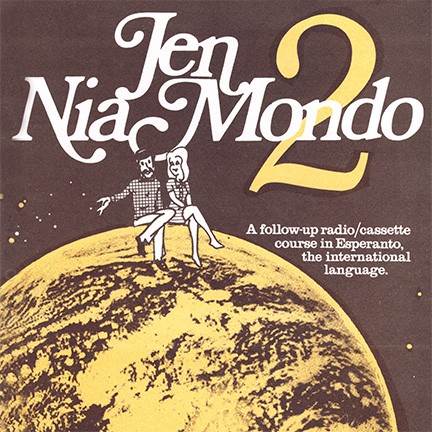
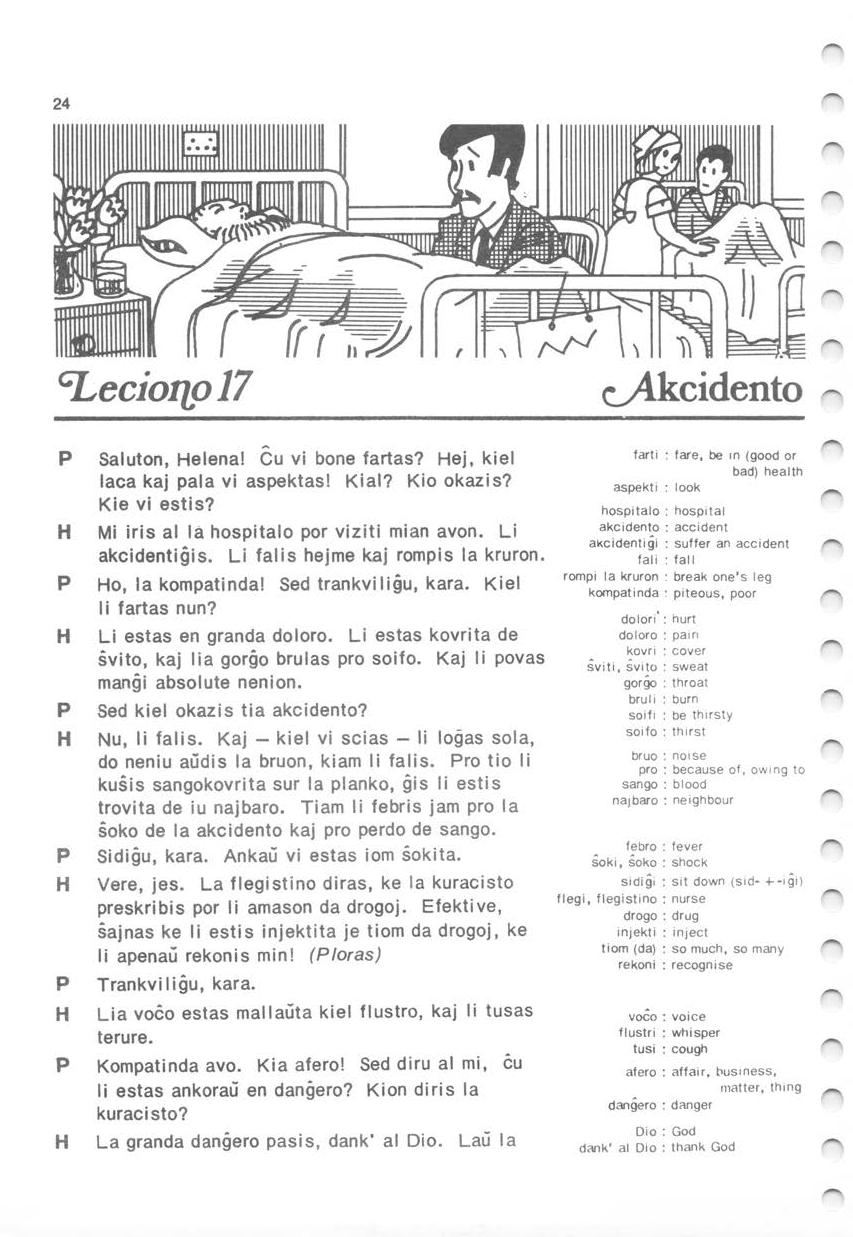
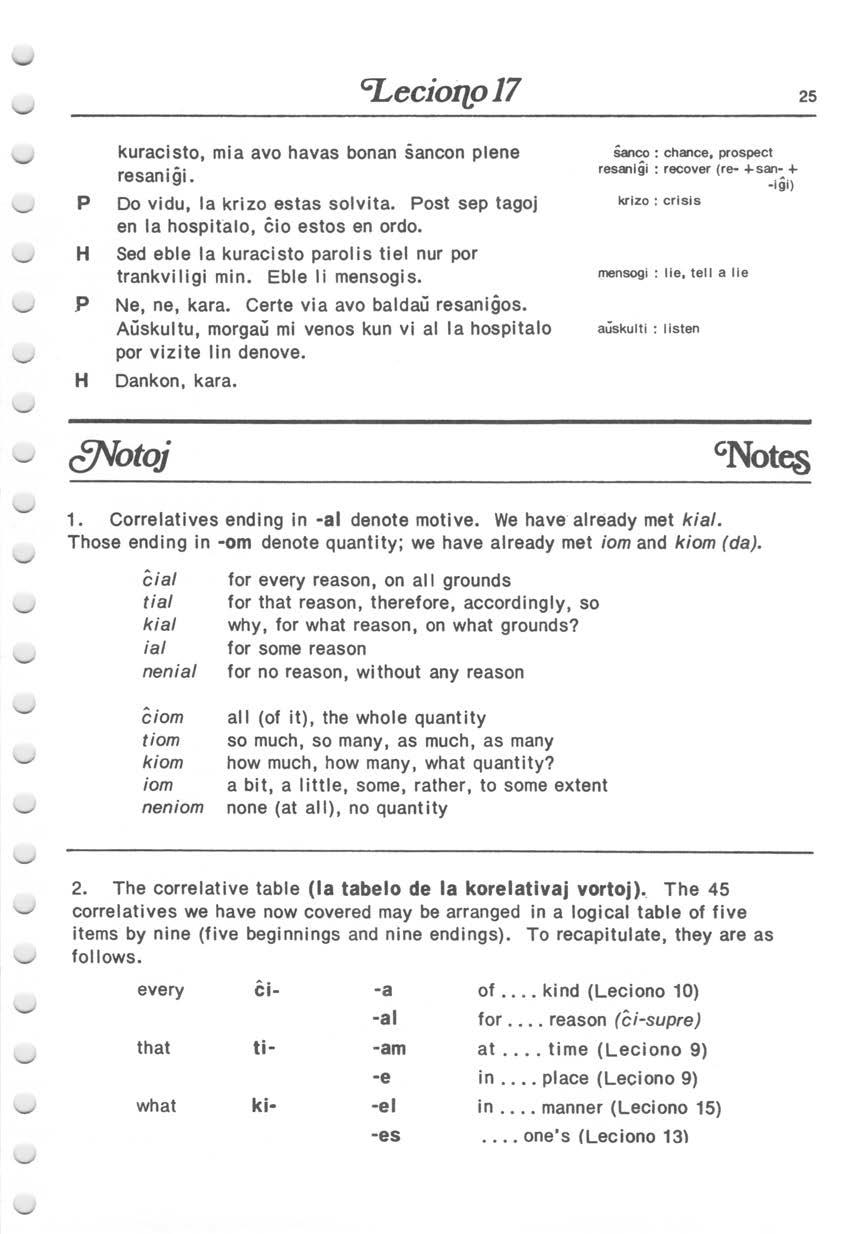
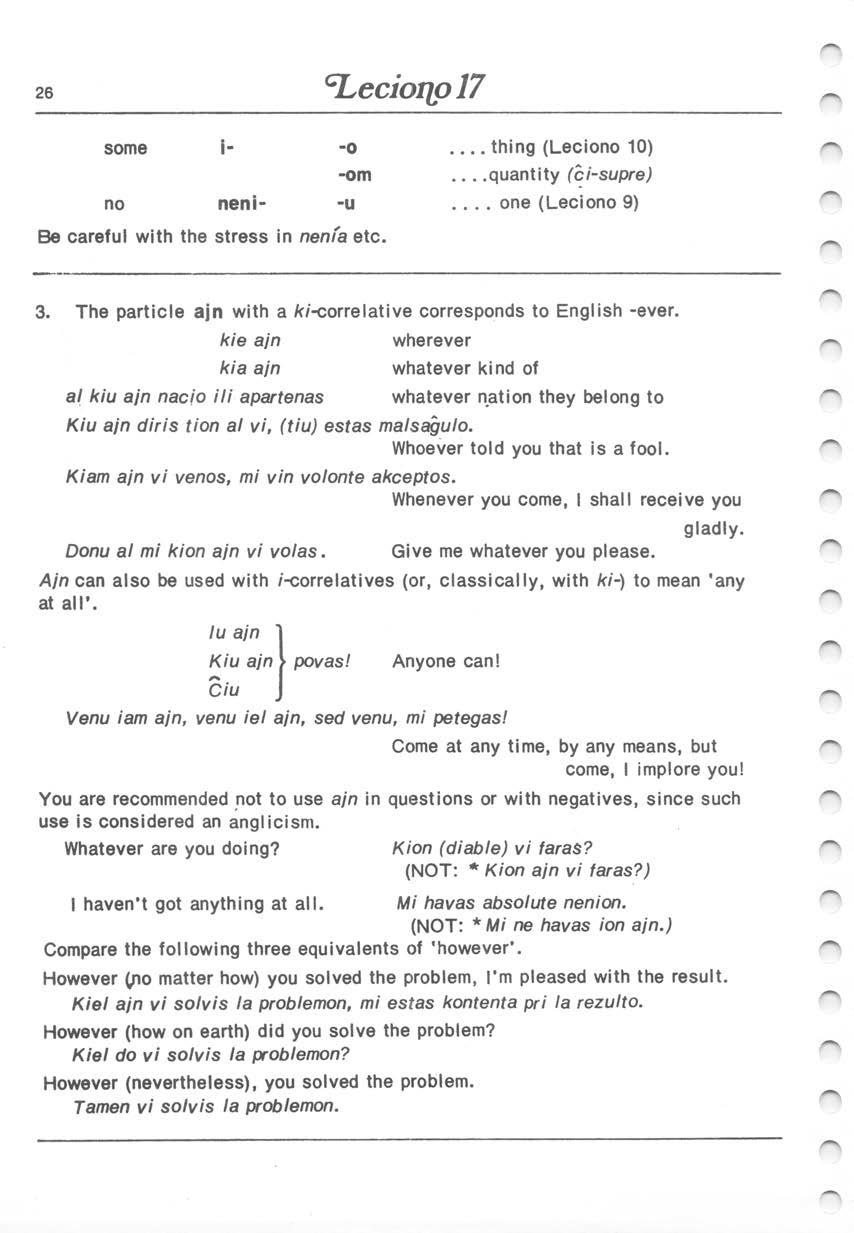
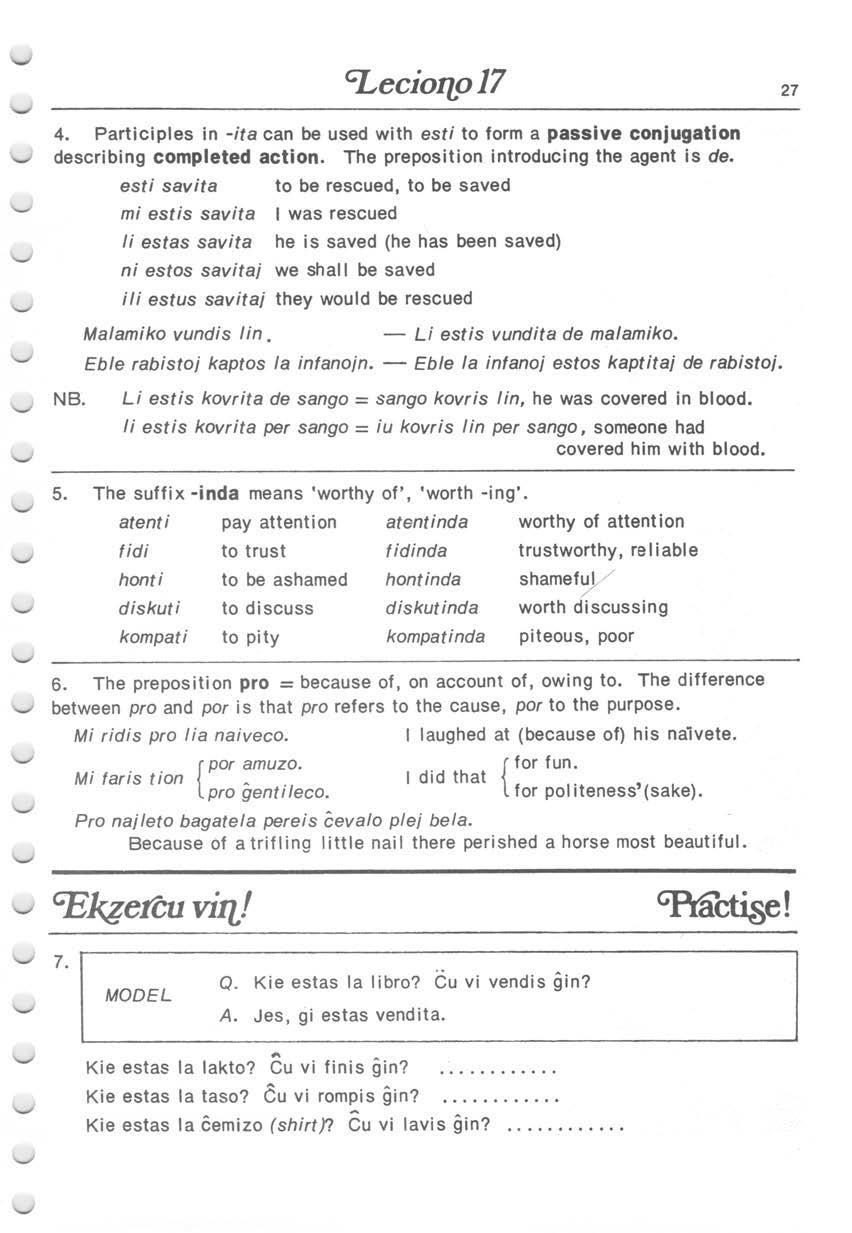
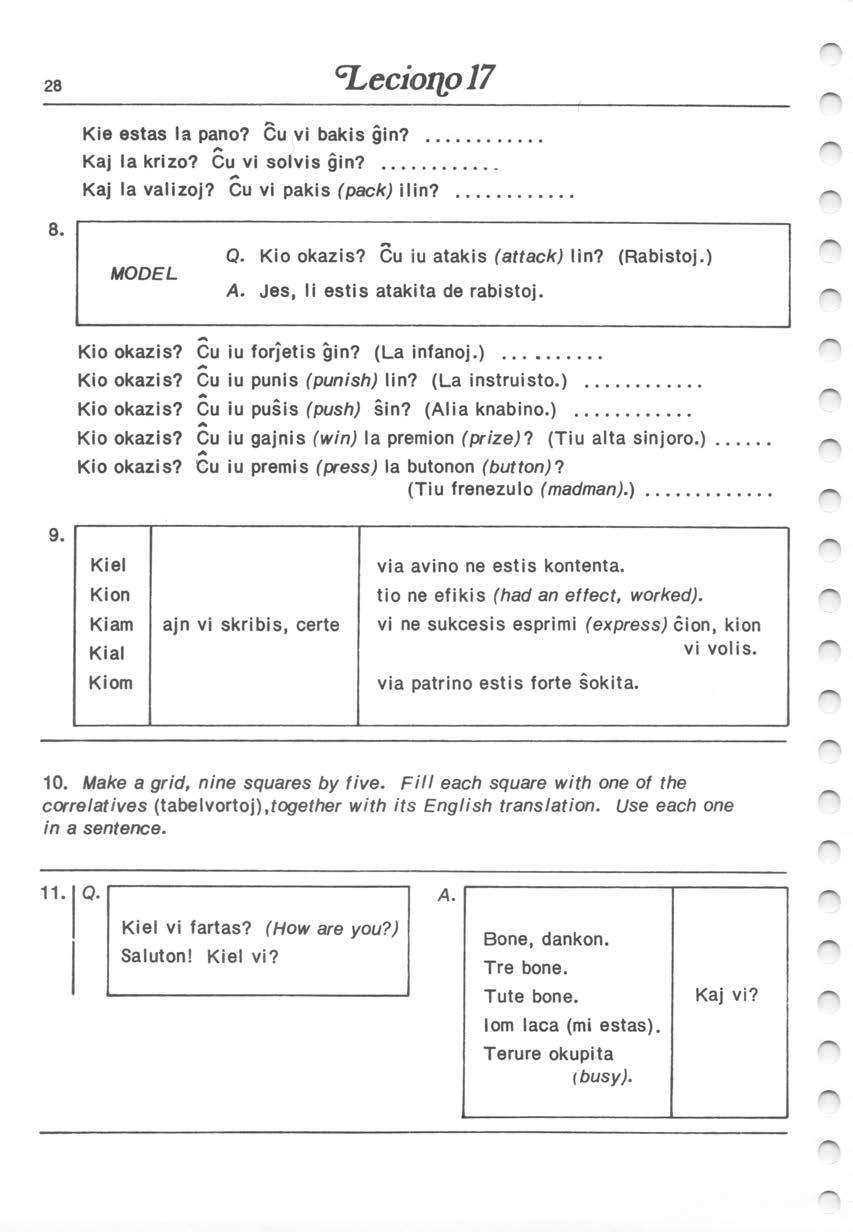
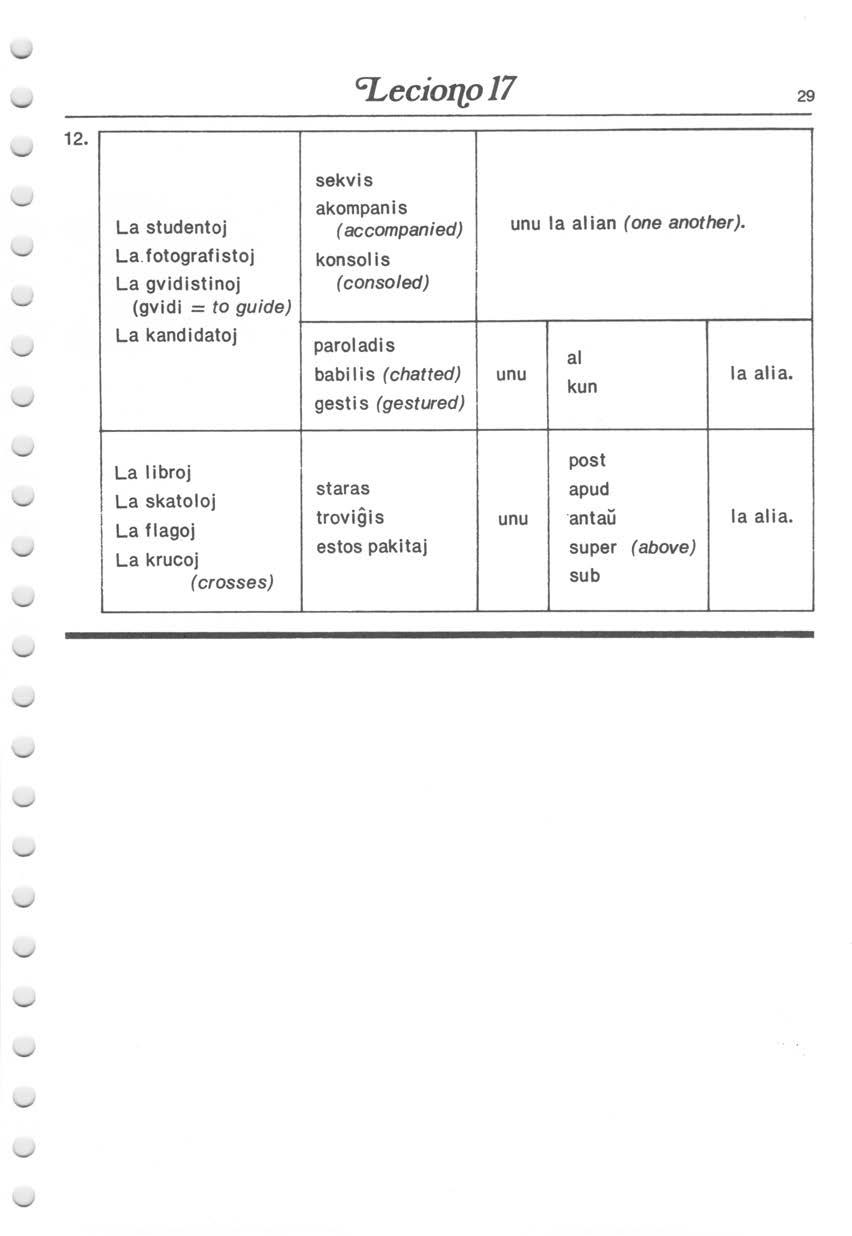
Section 13 Traduku
Sample Answers are offered below
As previously you are recommended to commit as much to writing as possible. It helps to ‘lock things into the brain’! As before, the following are only a selection of possible answers. Advice on using a ‘passive conjunction’ is discussed in a later lesson.
How does one remember which correlative ending is which? Some use these –
‘-a’ like
‘-al’ what is the rationALe? i.e. the reason
‘-am’ AM I late this a.m.? i.e. it’s time related
‘-e’ nowhere like home i.e. location
‘-el’ how the hELL’ do I know how to do it
‘-es’ English uses ‘s’ – whose, a mother‘s son
‘-o’ an object
‘-om’ an OMount, quantity
‘-u’ individUal , unique
Please attempt the exercises before consulting the material below.
Lesson 17 Answers with a ‘bits’ added. Why not add your own?
Section 7
Q. Kie estas la lakto? Ĉu vi finis ĝin?
A. Jes, ĝi estas finita. Jen estas la malplena laktujo.
Q. Kie estas la taso? Ĉu vi rompis ĝin?
A. Jes, ĝi estas rompita. Bedaŭrinde ĝi falis sur la plankon.
Q. Kie estas la ĉemizo? Ĉu vi lavis ĝin?
A. Jes, ĝi estas lavita kaj nun tute freŝa denove (lesson 4)
Q. Kie estas la pano? Ĉu vi bakis ĝin?
A. Mi ne scias, kie la pano estas. Mi certe ne bakis iom. Mi ne scias kiel baki panon.
Q. Kaj la krizo? Ĉu vi solvis ĝin?
A. Kompreneble mi solvis ĝin. Eh … vi ja intencis diri ‘kvizo’ anstataŭ ‘krizo’, ĉu ne?
Q. Kaj la valizoj? Ĉu vi pakis ilin?
A. Jes, mi pakis niajn aĵojn tre nete en la valizojn.
Section 8
Q. Kio okazis? Ĉu iu forĵetis ĝin?
A. Jes, ĝi estis forĵetita de la infanoj / Jes, forĵetis ĝin la infanoj
Note: the second reply is shorter, avoids the heavier passive form, exploits Esperanto’s flexible word order, draws attention to the agent and avoids ‘de’, a word with various meanings in Esperanto.
Q. Kio okazis? Ĉu iu punis lin?
A. Jes, li estis punita de la instruisto / Jes, punis lin la instruisto.
Q. Kio okazis? Ĉu iu puŝis ŝin?
A. Jes, ŝi estis puŝita de alia knabino / Jes alia knabino puŝis ŝin / Jes, puŝis ŝin alia knabino.
Q. Kio okazis? Ĉu iu gajnis la premion?
A. Jes la premio estis gajnita de tiu akta sinjoro / Jes, tiu alta sinjoro ĝin gajnis / Jes, ĝin gajnis tiu alta sinjoro
Q. Kio okazis? Ĉu iu premis la butonon?
A. Jes ja. Ĝi estis premita de tiu frenezulo / Jes tiu frenezulo ĝin prenis. / Jes, premis ĝin tiu alta sinjoro.
Noto: Poste ni studos aliajn pasivajn formojn. Ĉi tiu kun ‘-ita’ estas la plej ofta.
Section 9
Whatever you wrote, you certainly did not succeed in expressing everything you wished.
Kial ajn vi skribis, certe via patrino estia ŝokita
Whatever the reason you wrote, your mother was certainly shocked,
Kiom ajn vi skribis, certe ĝi ne estis sufiĉe longa por via estro.
However much you wrote, it certainly was not sufficiently long for your boss.
Section 10
Here is the complete table of Esperanto’s so-called “correlatives” – a relatively simple way to remember a whole set of words, most but not all of which are very important. The extra labels are to assist in learning them. To ‘create’ any of the words just take one of the 5 beginnings across the top – in blue. Now add one of the endings in the final column on the right – in red. Each correlative has an “i” in the middle or in one set (as “i” is itself a beginning) at the start of the word.
ĉi– | ki– | i– | neni– | ti– | |
ĉia | kia | ia | nenia | tia | –a |
ĉial for every reason | kial | ial | nenial | tial | –al |
ĉiam at every time | kiam at what time | iam at some time | neniam at no time | tiam at that time | –am |
ĉie | kie | ie | nenie | tie | –e |
ĉiel | kiel | iel | neniel | tiel | –el |
ĉies | kies | ies | nenies | ties | –es |
ĉio | kio | io | nenio | tio | –o |
ĉiom | kiom | iom | neniom | tiom | –om |
ĉiu | kiu | iu | neniu | tiu | –u |
| –a (kind) | ||
| –al (reason) | ||
| (every) ĉ– | –am (time) | |
| (what) k– | –e (place) | |
| (some) | –i– | –el (way) |
| (no) nen– | –es (one’s) | |
| (that) t– | –o (thing) | |
| –om (quantity) | ||
| –u (individual) |
Another way of looking at ‘creating correlatives’ is to choose one ‘beginning’ from the first column below. Secondly add -i- which coming in the ‘middle’ always precedes an ending. Thirdly, choose one ‘ending’ from the last column. You have again ‘created’ a complete correlative.
So you only need to learn 5 ‘beginnings’, 1 ‘middle’ and 9 ‘endings’ (15 ‘bits’ in total) to learn 45 words – not bad value! Most of them are very useful and common. You may be able to guess which of them are not often used! Note these words cannot be disassembled and the ‘bits’ used separately. The bits are not roots. Rather, each complete ‘correlative’ is a root, a basic idea in the language. When it makes sense, correlatives can take endings such as ‘o’ and ‘a’. e.g. ‘kialo’ means ‘a reason’, ‘iamo’ means ‘some unknown time’, ‘kioma’ means ‘how many-th’, ‘tien’ means ‘towards / into that place’.
Ĉia – Ne ĉian penson metu sur la langonᶻ
Ĉial – Tio estas ĉial konsilinda
Ĉiam – Prenu kiel vi volas, la poto ĉiam bolasᶻ
Ĉie – Malsaĝulo ĉie sian nomon skribasᶻ
Ĉiel – Ili ĉiel helpis nin
Ĉies – Esperanto estas ĉies propraĵoᶻ
Ĉio – Ne ĉio brilanta estas diamantoᶻ
Ĉiom – Donu al la lupo iom, li postulos ĉiomᶻ
Ĉiu – Ĉiu estis junulo, ĉiu estis pekuloᶻ
Kia – Kia naskiĝis, tia grandiĝisᶻ
Kial – Kial vi plorasᶻ?
Kiam – Kiam mi povos paroli al ŝi?ᶻ
Kie – Kie jukas, tie ni gratasᶻ
Kiel – Ĝi baraktis kiel fiŝo ekster akvo
Kies – La kato scias kies lardon ĝi manĝisᶻ
Kio – Kio estis liaj lastaj vortoj?ᶻ
Kiom da lingvoj vi parolas?ᶻ
Kiu – Kiun daton ni havas hodiaŭ?
Ia – Via vino estas nur ia abomena acidaĵoᶻ
Ial – La mondo ial rigardis ilin senkonfideᶻ
Iam – Morti iam vi ja devasᶻ
Ie – Mi renkontis vin ie, sed mi ne memoras kie.
Iel – Ili ĉiel helpis nin
Ies – Esperanto estas ĉies propraĵoᶻ
Io – Ne ĉio brilanta estas diamantoᶻ
Iom – Donu al la lupo iom, li postulos ĉiomᶻ
Iu – Ĉiu estis junulo, ĉiu estis pekuloᶻ
Nenia – Ne ĉian penson metu sur la langonᶻ
Nenial – Tio estas ĉial konsilinda
Neniam – Prenu kiel vi volas, la poto ĉiam bolasᶻ
Nenie – Malsaĝulo ĉie sian nomon skribasᶻ
Neniel – Ili ĉiel helpis nin
Nenies – Esperanto estas ĉies propraĵoᶻ
Nenio – Ne ĉio brilanta estas diamantoᶻ
Neniom – Donu al la lupo iom, li postulos ĉiomᶻ
Neniu – Ĉiu estis junulo, ĉiu estis pekuloᶻ
Tia –
Tial –
Tiam –
Tie –
Tiel –
Ties –
Tio –
Tiom –
Tiu –
Section 11
Section 12
Section 13 Traduku
Helen: Did you hear that Robert had (suferi) a car accident?
Peter: No. Was anybody hurt?
Helen: Robert was not driving (veturigi), but he was the only one hurt (vundi). Caroline (Karolina) was driving but she was not at fault (kulpa). Both were very shocked.
Peter: What happened? Was the other driver injured? What happened to the cars?
Helen: What questions! There was no other car, so no other driver. A pedestrian (piediranto) stepped (paŝi) into the road. Luckily Caroline did not hit (trafi) her but she hit a bollard (bolardo) instead. Robert hit his head somehow and hurt an arm. The car was quite badly damaged (damaĝi) by the bollard. The repairer (ripari) had to send a lorry (kamiono) to drag the car away. Robert needed an ambulance. (ambulanco). Caroline went with him to hospital.
Peter. What a saga (sagao)!
Section 14 Report
Paul is a close friend of Mary and Peter. Michael (Mikaelo) is Mary’s grandfather and has heard all about his fall. Write a short report on what Paul has heard about Michael’s injuries from the fall, whether the old man was taken to hospital and what the doctors and nurses are like there. Tells us also how Mary’s grandfather is faring, how she has taken the matter and whether she intends to visit the hospital.
Lesson 17 : Vocabulary
Afer/o
Ajn
Akcident/iĝ/i
Akcident/o
Akompan/i
Atent/i
Atent/ind/a
Aspekt/I
Atak/i
Atent/inda
Aŭskult/i
Babil/i
Bru/o
Brul/i ntr
Brul/ig/i tr
Buton/o
Ĉial
Ĉiom
Danĝer/o
Dank’ al Di/o
Di/o
Dolor/i ntr
Dolor/o
Drog/o
Efik/i
Esprim/i
Fal/i
Fart/i
Febr/o
Fleg/i
Fleg/ist/in/o
Flustr/i
Frenez/ul/o
Gajn/i
Gest/o
Gorĝ/o
Gvid/i
Hospital/o
Ial
Iam ajn
Iel ajn
Ind/a
Injekt/i
Iom
-ita (de)
Ĵet/i
Kapt/i
Kia ajn
Kial
Kiam ajn
Kie ajn
Kiel ajn
Kio ajn
Kiu ajn
Kompat/ind/a
Kompat/i
Konsol/i
Kovr/i
Kviz/o
Kriz/o
Kruc/o
Krur/o
Kurac/i
Kurac/ist/o
Mensog/i
Najbar/o
Nenial
Neniom
Okup/it/a
Pak/i
Por amuz/o
Prem/i
Premi/o
Pro
Pro amuz/o
Pun/i
Puŝ/i
Re/kon/i
Re/san/iĝ/i
Romp/i
Ŝanc/o
Sang/o
Sav/it/a
Sav/i
Sid/iĝ/I
Soif/i
Soif/o
Super
Ŝok/i
Ŝok/o
Ŝvit/i
Ŝvit/o
Tial
Tiom
Tiom (da)
Tus/i
Voĉ/o
Vund/it/a
Vund/i
Affair, business, thing
-ever
Suffer an accident
Accident
Accompany
Pay attention to
Worthy of attention
Have look of
Attack
Worthy of attention
Listen
Chat, gossip
Noise
Burn, be on fire
Burn, consume by fire
Button
For every reason
All of it, the whole
Danger
Thank God (set phraze)
God cf divine
Hurt, be painful
Pain cf doloroso
Drug
Have effect on
Express
Fall
Be in good / bad health
Fever
Nurse
Female nurse
Whisper
Madman
Win, gain
Gesture
Throat cf disgorge
Guide
Hospital
For some reason
At any time
By any means
Worthy
Inject
A bit, a little, some
Action completed (by)
Throw
Catch, capture
Whatever kind of
Why, for what reason
Whenever
Wherever
By any means
Whatever
Whoever
Piteous, cf compassion
Have compassion on
Console
Cover
Quiz
Crisis, emergency
Cross
Leg
Treat medically
Medic, (medical) doctor
Lie, tell a lie
Neighbour
For no reason
None at all, no quantity
Busy, occupied
Pack
Aimed at amusement
Press, oppress
Prize (not ‘premium’)
Because of, owing to
From amusement
Punish
Push
Recognise
Recover health again
Break a leg
Chance, prospect
Blood cf sanguine
Be rescued
Rescue, save
Sit down, become seated
Be thirsty
Thirst
Above, over (prep)
Shock, give shock to
Shock
Sweat, give out sweat
Sweat
For that reason
So much, so many
So much, so many of
Cough
Voice; vote
Wounded
Wound